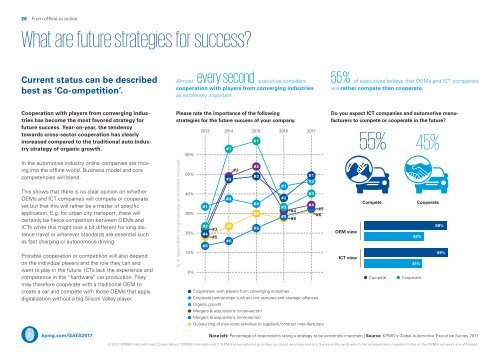Global Automotive Executive Survey 2017
global-automotive-executive-survey-2017
global-automotive-executive-survey-2017
You also want an ePaper? Increase the reach of your titles
YUMPU automatically turns print PDFs into web optimized ePapers that Google loves.
28 From offline to online<br />
What are future strategies for success?<br />
Current status can be described<br />
best as ‘Co-ompetition’.<br />
every second executive considers 55 %<br />
Almost<br />
cooperation with players from converging industries<br />
as extremely important.<br />
of executives believe that OEMs and ICT companies<br />
will rather compete than cooperate.<br />
Cooperation with players from converging industries<br />
has become the most favored strategy for<br />
future success. Year-on-year, the tendency<br />
towards cross- sector cooperation has clearly<br />
increased compared to the traditional auto industry<br />
strategy of organic growth.<br />
In the automotive industry online companies are moving<br />
into the offline world. Business model and core<br />
competencies will blend.<br />
This shows that there is no clear opinion on whether<br />
OEMs and ICT companies will compete or cooperate<br />
yet but that this will rather be a matter of specific<br />
application. E.g. for urban city transport, there will<br />
certainly be fierce competition between OEMs and<br />
ICTs while this might look a bit different for long distance<br />
travel or wherever standards are essential such<br />
as fast charging or autonomous driving.<br />
Possible cooperation or competition will also depend<br />
on the individual players and the role they can and<br />
want to play in the future. ICTs lack the experience and<br />
competence in the “hardware” car production. They<br />
may therefore cooperate with a traditional OEM to<br />
create a car and compete with those OEMs that apply<br />
digitalization without a big Silicon Valley player.<br />
Please rate the importance of the following<br />
strategies for the future success of your company.<br />
% of respondents rating a strategy as extremely important<br />
60%<br />
50%<br />
40%<br />
30%<br />
20%<br />
10%<br />
0%<br />
2013<br />
#1<br />
#2<br />
#4<br />
#6<br />
#3<br />
#5<br />
2014 2015 2016 <strong>2017</strong><br />
Cooperation with players from converging industries<br />
Corporate partnerships such as joint ventures and strategic alliances<br />
Organic growth<br />
#1<br />
#3<br />
#4<br />
#5<br />
#6<br />
#2<br />
#1<br />
#2<br />
#5<br />
#6<br />
Mergers & acquisitions (cross-sector)<br />
Mergers & acquisitions (inner-sector)<br />
#3 #1<br />
#2<br />
#1<br />
#4<br />
Outsourcing of (non-)core activities to suppliers / contract manufacturers<br />
#2<br />
#3<br />
#5<br />
#4<br />
#6<br />
#3<br />
#4<br />
#5<br />
#6<br />
Do you expect ICT companies and automotive manufacturers<br />
to compete or cooperate in the future?<br />
OEM view<br />
ICT view<br />
55%<br />
Compete<br />
Compete<br />
42%<br />
41%<br />
Cooperate<br />
45%<br />
Cooperate<br />
58%<br />
59%<br />
kpmg.com/GAES<strong>2017</strong><br />
Note left: Percentage of respondents rating a strategy to be extremely important | Source: KPMG’s <strong>Global</strong> <strong>Automotive</strong> <strong>Executive</strong> <strong>Survey</strong> <strong>2017</strong><br />
© <strong>2017</strong> KPMG International Cooperative (“KPMG International”). KPMG International provides no client services and is a Swiss entity with which the independent member firms of the KPMG network are affiliated.



